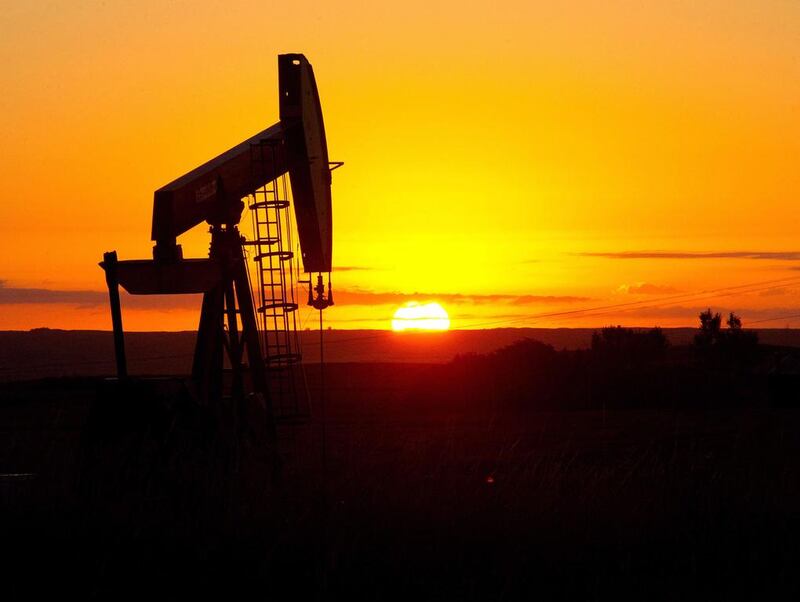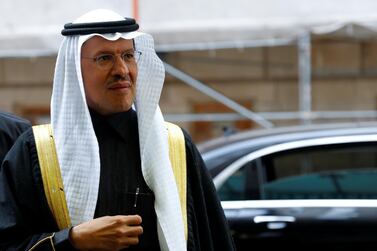Oil prices fell on Wednesday as a jump in US crude inventories and surging Covid-19 cases raised fears of an oversupply of oil and weak fuel demand amid rising coronavirus cases in the US and Europe.
Brent, the international benchmark for more than half of the world's crude, slipped 3.86 per cent to trade at $39.61 per barrel at 3.30pm UAE time. West Texas Intermediate, the key gauge for US oil, was down 4.7 per cent at $37.71 per barrel.
The American Petroleum Institute reported that US crude oil and gasoline stocks rose last week, with crude inventories increasing by 4.6 million barrels to about 495.2 million barrels, against analysts’ expectations in a Reuters poll for a build up of 1.2 million barrels.
A resurgence of coronavirus cases globally, particularly in the US and Europe, has also hit prospects for crude demand.
“The rise in Covid infections would spark additional stay-at-home orders that curb economic growth and are negative for crude prices,” Avtar Sandu, senior manager of commodities at Singapore-based Phillip Futures, said in a note on Wednesday. “The crude market had also been surprised by the rise in the US rig count for the sixth week."
The weaker demand and additional supply from Libya has caused prices to deteriorate, despite expected to disruption to US production from Hurricane Zeta, Mr Sandu said.
On Tuesday, oil prices had some support from the potential drop in US production as oil companies began shutting offshore rigs with the approach of Hurricane Zeta in the Gulf of Mexico.
Production from Libya is also expected to rise in the coming weeks after the National Oil Corporation (NOC) of Libya lifted a force majeure on oil exports from the eastern ports of Sidra and Ras Lanuf on Friday. Force majeure refers to an unforeseen event outside of a party's control that prevents it from fulfilling its obligations under a contract.
Production from the North African country is expected to rise above 1 million barrels per day in the next four weeks following the development.
Investors are also closely watching developments ahead of next week’s US presidential elections, according to Ehsan Khoman, head of Mena Research and Strategy at MUFG Bank.
"We would caution the plain notion that Trump is bullish for oil prices and Biden is bearish. A Biden victory in fact [will] prove a short-term catalyst for oil prices even under a split House and Senate, given the unlocking of significant fiscal stimulus, alongside expected US dollar depreciation," he said.
Saudi Arabia’s energy minister on Monday said oil markets have overcome the steepest declines in terms of demand but the Opec+ group of producers remains vigilant.
“I guess the worst part is over,” Prince Abdulaziz bin Salman said at the online India Energy Forum by CERAWeek. “We are very much vigilant. There is a big shift altogether in terms of where we are today and where we were in April and May.”
Naeem Aslam, chief market analyst at London-based Avatrade expects oil to fall further due to oversupply and weak demand.
“Currently, the crude oil price is trading below $40, and it is likely that the price may continue its journey toward the $37 mark,” he said in a note to investors on Wednesday.
“The API report ... is the last thing that investors want to see.”
Saudi Arabia-based Jadwa Investment, however, believes Brent prices will remain around the current level during the remainder of the fourth-quarter, with little upside as many countries around the world grapple with a second wave of the virus.
The current Opec forecast suggests a progressive pick-up in oil demand next year, and a deficit in daily oil balances, which, Jadawa said, will help to lower record-high commercial oil inventories and support prices.
The recovery in oil demand in 2021, however, will not be smooth.
The risks are "skewed to the downside”, with a more prolonged and serious outbreak of Covid-19 being the biggest threat, the investment bank said in a note.
The planned Opec+ supply boost of 1.9 million barrels per day from January is also another downside, exerting further "psychological pressure" on oil prices, according to Vandana Hari, founder and chief executive of Singapore-based Vanda Insights.
"It will continue to be factored in unless and until Saudi and Russian energy ministers give a clear indication that they are rethinking the next round of tapering of production cuts," she told The National.
Opec+, the producer alliance led by Russia and Saudi Arabia is currently cutting output by 7.7 million barrels per day to help balance markets. Production is set to increase again in January as part of the gradual easing of supply curbs.







